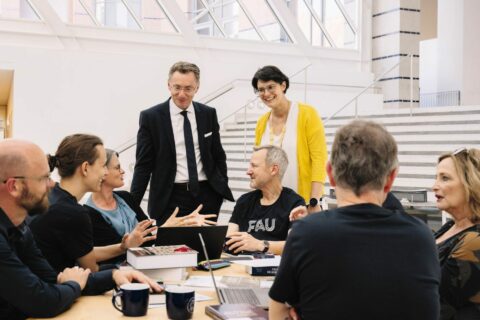Human rights have always been controversial

Interview with migration and human rights activist Anuscheh Farahat
Anuscheh Farahat is Professor of Public Law, Migration Law and Human Rights at FAU. A conversation about her research, and why FAU is the ideal location for it.
Prof. Farahat, what draws you to the topic of human rights?
My original focus was on migration. There, the question often arises as to what rights people have when they are in the minority in a society. Migrants are of course a case in point. People who have had to flee their home country rely on receiving effective protection and being treated fairly. Human rights play a crucial role in this respect. The same also applies, however, to the question of how to protect employees in global supply chains, where they are subject to exploitation by very powerful stakeholders, in particular companies. As a legal expert, I am keen to find legal solutions and approaches for how to help under-privileged people and improve their situation.
Where does your focus lie?
In my research, I try to connect the topics of migration and human rights. However, I am interested in fundamental issues as well. What is the reason behind many states deliberately choosing to disregard human rights and attempting to call them into question or delegitimize them? I am also interested in exploring the impact of social transformation processes, from digitalization to climate change, on our options for enforcing human rights. We must consider whether human rights today have to serve a different purpose than they did 75 years ago, when the General Declaration of Human Rights was proclaimed by the United Nations.
Are the human rights cited in the UN Charter no longer in keeping with our times?

They are more in keeping with the times and more important than ever before. We must remember that human rights have always been controversial. Those who were disadvantaged or suppressed had to fight tooth and nail for them from those who were in power. Today, suppression, discrimination or exploitation take a different form, and there are different opinions on how human rights should be interpreted and applied. However, one thing remains true: our understanding of human rights reflects our fundamental convictions of how we should treat each other. All that remains open to discussion and has to be reconsidered again and again is the question of what this actually means in any individual instance and how best to implement it in practice, weighing it up against other considerations.
Where do you think there is most need for change and adaptation?
As algorithms are increasingly being used in decision-making processes, coupled with the fact that immense quantities of data can be collected about us, we must take care to protect personal rights, also with respect to discrimination. In addition, the question arises as to who has which rights and how far-reaching they are, both in terms of content and location. Specifically: When is the state obliged to protect people who arrive after crossing the Mediterranean? To what extent must a state accept responsibility for using the services of private initiatives or a third state that violate human rights? Another new challenge: Normally human rights refer to the here and now. However, in view of climate change, we must ask ourselves how we can feasibly protect the rights of future generations. I believe that it is important to take a more systematic approach to linking human rights research and practice and to raise awareness of the problems in many different parts of the globe.
Is FAU a good location for working and carrying out research into these topics?
In my opinion, FAU offers ideal conditions for human rights research for various reasons. One reason is that extensive research is carried out on the topic in various different subject areas. The very fact that a Chair of Human Rights and Human Rights Policy was established in 2009 and that researchers in the Centre for Human Rights at FAU have been involved in research into regional, national and international developments in the area of human rights since 2015 underlines its significance. Focusing on human rights in this way makes it possible for the topic of human rights to be analyzed from various perspectives. I very much appreciate the opportunity of contributing to this research. We are also in the lucky position of working closely with the Office of Human Rights of the city of Nuremberg, the International Nuremberg Principles Academy and the Nuremberg Centre of Human Rights. We should appreciate that we are conducting research into human rights in a very special historical location. People in the region are conscious of the significance of human rights, especially in light of historical events, and this certainly makes itself felt.
by Michael Kniess
Research Centre FAU CHREN

The FAU Research Centre for Human Rights Erlangen-Nürnberg (FAU CHREN) focuses on current questions regarding human rights in theory and in practice. These include recognition of human dignity, the indivisibility of human rights and the principle of non-discrimination. The center investigates the implications of these universal rights for politics. In addition, it stands up for the continued development of the international protection of human rights and its implementation on a universal scale.
This article is part of the FAU Magazin

A university thrives because of the people who research, study, teach and work there. A university is supported by people who are connected to it as alumni, friends and sponsors and who are committed to promoting its interests all over the world.
They all contribute their unique talents, skills and perspectives. It is this diversity that makes our FAU a place of innovation, a place where many talented individuals tackle the major challenges of our times together, and a place where they keep finding answers.
Read more articles online Download: FAU Magazin (PDF)
